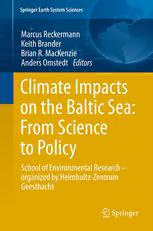
Climate Impacts on the Baltic Sea: From Science to Policy: School of Environmental Research - Organized by the Helmholtz-Zentrum Geesthacht PDF
Preview Climate Impacts on the Baltic Sea: From Science to Policy: School of Environmental Research - Organized by the Helmholtz-Zentrum Geesthacht
Climate Impacts on the Baltic Sea: From Science to Policy Springer Earth System Sciences Forfurthervolumes: http://www.springer.com/series/10178 Marcus Reckermann Keith Brander l l Brian R. MacKenzie Anders Omstedt l Editors Climate Impacts on the Baltic Sea: From Science to Policy School of Environmental Research – Organized by the Helmholtz-Zentrum Geesthacht Editors MarcusReckermann KeithBrander Helmholtz-ZentrumGeesthacht TechnicalUniversityofDenmark (HZG) JaegersborgAllé1 Max-Planck-Strasse1 Charlottenlund Geesthacht Denmark Germany BrianR.MacKenzie AndersOmstedt TechnicalUniversityofDenmark UniversityofGothenburg JaegersborgAllé1 EarthSciencesCentre Charlottenlund Gothenburg Denmark Sweden ISBN978-3-642-25727-8 ISBN978-3-642-25728-5(eBook) DOI10.1007/978-3-642-25728-5 SpringerHeidelbergNewYorkDordrechtLondon LibraryofCongressControlNumber:2012936488 # Springer-VerlagBerlinHeidelberg2012 Thisworkissubjecttocopyright.AllrightsarereservedbythePublisher,whetherthewholeorpart of the material is concerned, specifically the rights of translation, reprinting, reuse of illustrations, recitation,broadcasting,reproductiononmicrofilmsorinanyotherphysicalway,andtransmissionor informationstorageandretrieval,electronicadaptation,computersoftware,orbysimilarordissimilar methodologynowknownorhereafterdeveloped.Exemptedfromthislegalreservationarebriefexcerpts inconnectionwithreviewsorscholarlyanalysisormaterialsuppliedspecificallyforthepurposeofbeing enteredandexecutedonacomputersystem,forexclusiveusebythepurchaserofthework.Duplication ofthispublicationorpartsthereofispermittedonlyundertheprovisionsoftheCopyrightLawofthe Publisher’s location, in its current version, and permission for use must always be obtained from Springer.PermissionsforusemaybeobtainedthroughRightsLinkattheCopyrightClearanceCenter. ViolationsareliabletoprosecutionundertherespectiveCopyrightLaw. Theuseofgeneraldescriptivenames,registerednames,trademarks,servicemarks,etc.inthispublication doesnotimply,evenintheabsenceofaspecificstatement,thatsuchnamesareexemptfromtherelevant protectivelawsandregulationsandthereforefreeforgeneraluse. Whiletheadviceandinformationinthisbookarebelievedtobetrueandaccurateatthedateofpublication, neithertheauthorsnortheeditorsnorthepublishercanacceptanylegalresponsibilityforanyerrorsor omissionsthatmaybemade.Thepublishermakesnowarranty,expressorimplied,withrespecttothe materialcontainedherein. Printedonacid-freepaper SpringerispartofSpringerScience+BusinessMedia(www.springer.com) Preface TheBalticSeaareaisanoldculturallandscapewithawelldevelopedinternational framework for monitoring, assessing and managing its marine ecosystems. It provides agoodcasestudyfor otherregions wheresuch management isbeingset up.Oneofourmainaimsistointroducethisexampleofmanagementinactiontoa widercommunity.TheexistingBalticSeaActionPlan,whichisamajorcomponent ofthemanagementframework,hasnotyetbeenextendedtoincludeclimatechange impacts,soanotheraimistosupplysomeofthebackgroundneededtodothis. With a catchment basin covering almost 20% of the European continent, the BalticSeaisoneofthelargestbrackishseasintheworld.Itspansdifferentclimate and population zones, from the temperate, highly populated and industrialized south with intensive agriculture, to the boreal and rural north. The Baltic Sea featuressomenaturalpeculiaritieswhichmakeitsecosystemsespeciallyvulnerable to external stresses due to pollution, eutrophication and climate change. Water exchange with the North Sea and world oceans is limited; the deep basins are separatedbysills,andthereisasteepsalinitygradient fromsouthtonorth.Inthe past decades, the Baltic Sea has demonstrated its sensitivity to various human pressuresandtoclimatechange. This book is the outcome of a Summer School titled “Climate Impacts on the BalticSea:FromSciencetoPolicy”,whichtookplaceinNexøontheDanishBaltic Sea island of Bornholm, 27 July to 5 August 2009. The purpose of the summer schoolwastoprovideanintroductiontotheentirerangeofclimatechangeimpacts ontheBalticSea,includingitscatchmentbasin,fromthephysicalandbiologicalto the societal and political impacts. An interdisciplinary approach was followed: studentsfromdifferentnaturalsciencedisciplinescomingtogethertodevelopskills in observing, modelling, projecting and interpreting physical and biological changes in the Baltic Sea. An important goal of the course was to demonstrate howdiscipline-specificscientificknowledgecanbecombinedinordertocontribute torealmanagementsolutionsattheecosystemlevel,andhowscientificassessments ofclimatechangeimpactscanbecommunicatedtopolicymakersandthegeneral public. Such interdisciplinary assessments are increasingly required as part of the v vi Preface management of societal pressure on marine ecosystems and to deal with the additionalpressurefromclimatechange. TwentystudentsfromallacrosstheBalticSeacametogetherinthe“Møbelfab- rikken”, a former furniture factory, which proved to be a perfect venue for the course. Sunny, warm weather and occasional recreational swims at the nearby rockybeachescontributedtothegoodspirit.Thefacilitiesarecloseto‘Bornholms lakseklækkeri’(BornholmSalmonHatchery,ownedbyDTU-Aquaandusedasan experimental cod hatchery and release facility for stock enhancement) which was alsovisitedduringthecourse. StudentsandlecturersinfrontoftheMøbelfabrikken Studentswereassignedactivitiestodeveloptheirdiscipline-specificknowledge, learn how the knowledge could be translated to management and policy actions, andimprovegeneralscientificskills(e.g.oralandwrittenpresentationofscientific results; organisation and structuring of group work; collaboration with colleagues from different nations and disciplines). The course contained lectures, individual exercises,discussiontutorialsandgroupexercises.Onetypeofgroupexercisewas discipline-specific (e.g. related to modelling oceanographic or fish population responses to climate change), while the second was course-long, interdisciplinary and oriented to management objectives for the Baltic Sea ecosystem. This over- arching task was the preparation and presentation by four student groups of a “climatechangeactionplan”thatwouldsupplementtheexistingHELCOMBaltic Sea Action Plan. The task inspired some long evening and night sessions among Preface vii studentsandlecturers.Attheendofthecourse,studentswereaskedtogiveanoral presentation of their visions. The outcomes of this exercise (one page summaries and presentations) are available at the course website: www.baltex-research.eu/ baltic2009. Thechaptersinthisbookarebasedonlecturesgivenatthecourse.Theycovera range of topics, spanning from detailed descriptions of political agreements that protectthemarineenvironment,tobasicmodellinginstructions,toanassessmentof thepossibleimpactsofclimatechangeonthemarineecosystem,toareflectionon theroleofclimatescientistsandtheirresponsibilityinsociety. ChrisHopkinspresentsanextensiveoverviewoverinternationalenvironmental agreementsandconventionsanddemonstratestheirrole,importanceandeffective- ness for the environmental recovery of the Baltic Sea. This chapter represents an unprecedented summaryofthese activitiesinthe Baltic Searegion andEuropein general (Chap. 1). Minna Pyhälä focuses on a recent and important activity: the HELCOMBalticSeaActionPlan(BSAP)astheprominentinternationalagreement aiming at a fundamental recovery of the Baltic Sea (Chap. 2). Anders Omstedt discusses basic oceanographic features of the Baltic Sea, and gives a basic intro- ductionhowtheseprocesses,includingimportant aspectsofthecarboncycle,can be modelled (Chap. 3). Eduardo Zorita provides a basic introduction to the principlesofclimatemodellingwithaspecialemphasisontherelateduncertainties (Chap. 4). Keith Brander and Jon Havenhand give a short overview of the observedandpossiblefutureimpactsofclimatechangeonthemarineecosystems, including acidification (Chap. 5), and Rabea Diekmann and co-authors present some background on ecosystem theory related to abrupt ecosystem changes referredtoasregimeshifts,includingadescriptionofstatisticaltechniqueswhich canbeusedtoanalyzesuchregimeshifts(Chap.6).Sustainabilityisacentralterm in the protection and management of ecosystems, but it is also essential that scientists themselves act in a responsible and sustainable way, as explained by HansvonStorch(Chap.7). Thisinterdisciplinarybookisprimarilydirectedatstudentsandlecturersofthe environmentaldisciplinestoprovideanoverviewofthepossibleimpactsofclimate changeontheBalticSea.Wealsointendittoserveasagoodbackgroundreference forscientistsandpolicymakers,bothfortheBalticSeaareaandmoregenerally. MarcusReckermann KeithBrander BrianMacKenzie AndersOmstedt . Acknowledgments The summer school was co-organized by the Danish Technical University DTU- Aqua, the University of Gothenburg and BALTEX, the interdisciplinary research networkfortheBalticSeabasin.TheschoolwasprimarilysupportedbytheNordic Marine Academy (NMA) as an Advanced Course, and by BONUS, the Baltic Organisations Network for Funding Science EEIG. Further support came from the Danish Technical University (DTU-Aqua), the University of Gothenburg, Helmholtz-Zentrum Geesthacht (HZG, formerly GKSS) and its “Gesellschaft zur Förderung des GKSS Forschungszentrums e.V.”, fishnet.dk, EUR-OCEANS and BALTEX.ThesummerschoolisacontributiontotheBONUS+projectsBaltic-C andECOSUPPORT. The idea of a summer school initiated within the BALTEX and the EUR- OCEANS programmes. The editors and course organizers would like to thank Fritz Köster and David Turner for early discussions on the possibility to organize ajointEUR-OCEANS-BALTEXsummerschoolonBornholm,andGötzFlöserof Helmholtz-ZentrumGeesthacht(HZG)fortheopportunitytopublishthisbookina book series of HZG summer schools. The reviewers of chapter manuscripts are particularly thanked for their valuable comments to improve the quality of the manuscripts.ThankyoualsotoSilkeKöppenattheInternationalBALTEXSecre- tariat who put much effort into the technical editing of the manuscripts and obtaining permissions. Furthermore, we would like to thank all lecturers for their engagementandlastbutnotleastthestudentsfortheirinfectiousenthusiasm,which madethissummerschoolsuchapleasantandvaluableexperience. Theeditorsandcourseorganizers,July2011 MarcusReckermann InternationalBALTEXSecretariatatHelmholtz-Zentrum Geesthacht,Germany KeithBrander DanishTechnicalUniversity,NationalInstituteofAquatic Resources(DTUAqua),Charlottenlund,Denmark BrianMacKenzie DanishTechnicalUniversity,NationalInstituteofAquatic Resources(DTUAqua),Charlottenlund,Denmark AndersOmstedt DepartmentofEarthSciences,UniversityofGothenburg, Sweden ix
